spooh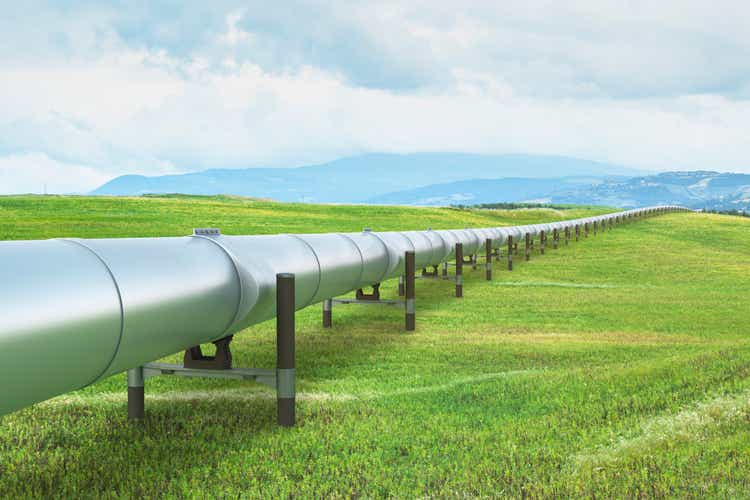
The writing was on the wall. There was always the fear that due to the war in Ukraine and the European Union imposing sanctions on Russia, there could be a premature halt to Russian gas exports to Europe. In the latest twist in the supply of natural gas saga, Russia has announced deeper cuts targeting Germany, which could go to the extent of ending all inflows.
With Russian volumes dropping, the supply of gas in the international market has slumped, in turn triggering prices to rise, as demand remains steady. Thus, the ProShares UltraShort Bloomberg Natural Gas (KOLD) which delivers two times the inverse of the daily performance of the Bloomberg Natural Gas SubIndex has been on a downtrend during the last year as shown in the chart below.
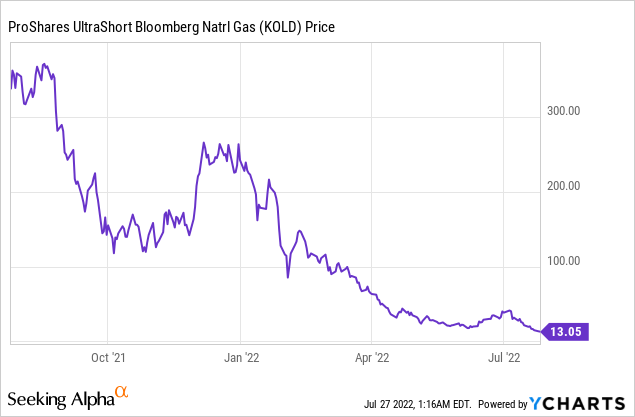
However, as seen by the fluctuations, it has not been a smooth downside to the $13 level, and the aim of this thesis is to precisely profit from these fluctuations to make money. For this purpose, I elaborate a trading strategy based on a comparison with the iPath Series B Bloomberg Natural Gas Subindex Total Return ETN (NYSEARCA:GAZ), which is an exchange-traded note and as its name suggests tracks the performance of the Bloomberg Natural Gas Subindex Total Return Index.
I start by providing insights into the demand and supply paradigm.
Demand vs. Supply
First, the price of natural gas and oil has been increasing sustainably during the last year mostly due to under-investment in supply in the aftermath of Covid, somewhat encouraged by some governments in Asia and Europe moving ahead with clean energy mandates. Thus as shown by the orange chart below, higher demand for natural gas due to the reopening of economies throughout the world led to GAZ rising in the first week of July 2021.
Comparison of KOLD and GAZ (www.seekingalpha.com)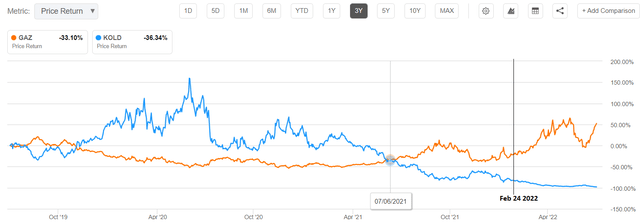
Subsequently, Covid variant infections put a brake to the upside, but the start of the Ukrainian conflict on February 24 was largely beneficial to oil and gas bulls as it resulted in a sustained rise in GAZ’s share price. In economic terms, this is explained by the market anticipating supply issues due to the fact that Russia is a large producer and exporter of natural gas.
Coming to KOLD’s price action, the blue chart above has been moving in the opposite direction as GAZ thereby confirming their opposite relationship, but the fact that the ProShares ETF delivers two times the inverse performance of the Bloomberg Natural Gas Subindex signifies that its downside has been much more pronounced. However, it also has enjoyed several episodic upsides, some sustained while others more abrupt, providing traders with opportunities to profit from the price of natural gas going down.
The last such episode started roughly around July 5 when turbines produced by Germany’s Siemens (OTCPK:OTCPK:SIEGY) and intended for Russia landed in Crimea, a region that initially formed part of Ukraine. Subsequently, following an escalation of geopolitical tensions between Europe and Russia involving cuts in the supply of Russian gas to Europe, prices are up.
Some Important Factors to Consider
As a result, GAZ has increased by nearly 50% while KOLD has fallen by around 60% as shown in the chart above. Therefore, the ultrashort ETF is certainly not a buy and hold, but rather one to own for a limited period of time, based on news updates around the volatility theme. Here, some can also argue that the Proshares ETF should have suffered more of a decline, or two times GAZ’s inverse performance of 50%.
This brings us to the compounding effect which characterizes leveraged ETFs which effectively means that actual returns will differ significantly from those expected. The underlying reason for this is daily volatility whereby the higher the degree of fluctuations between a time period when KOLD is held, the less the returns.
This is why it’s prudent to assess KOLD’s returns for the shortest time possible, namely for a single day. Then, it is better to buy the stock on news of gas prices going down before eventually selling it at the end of the trading day. One such example as per the deep blue chart below was on July 5 when KOLD returned 7.29% after GAZ dipped by 3.39%.
Comparing the performances of KOLD and GAZ (www.proshares.com)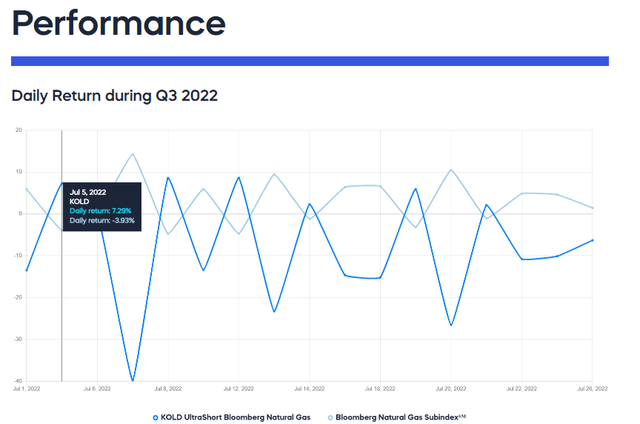
However, let us be realistic.
Unless you are an astute trader, it is not easy to get the timing right and out of the three times I traded KOLD, I made a profit only once and that was a tiny one too, not worth the amount of effort I had put in.
The strategy and Justifications
This time, my strategy, after buying at $12.88, is to trade over a longer time span of one week, but also be ready to incur some loss due to the compounding effect. The reason for being long on KOLD now is that GAZ has appreciated by nearly 40% during the last month as shown in the table below and the ultra-short ETF has dipped by over 60%.
Comparison of KOLD and GAZ (www.seekingalpha.com)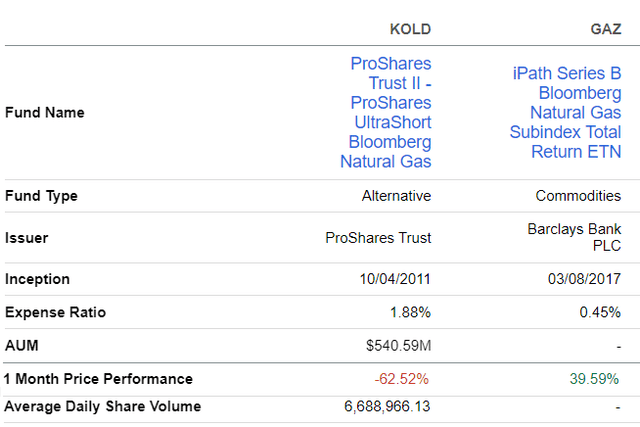
Therefore, you can consider it as a buy-the-dip strategy, but, I believe that the risk-reward ratio is favorable due to a number of factors as I elaborate below.
First, despite having excluded gas contracts from their sanctions against Russia, European Union countries have pursued a policy of reducing their dependence on Russia by looking to procure from countries like Algeria and Norway. Additionally, U.S. LPG exports to Europe have risen at multi-year highs.
Second, highly exposed to Russian gas, Germany will probably obtain some gas delivery from France through the existing pipeline linking the two countries in the name of European solidarity. It can also rely on imports from other countries like the Netherlands or Denmark.
Third, as seen with Siemens’ turbines, Russia is dependent on Western companies for critical spare components for its extensive pipeline network and can simply not afford to stop all commercial ties with the EU.
Fourth, China already imports a considerable amount of natural gas through pipelines to Turkmenistan and uses mostly coal and oil for energy production. Thus, it may not be able to absorb the surplus resulting from Russia completely cutting off supply to Germany which is an industrial powerhouse.
Conclusion
In the event that none of the above materialize, then a recession may impact Germany which would, in turn, cut the demand for natural gas considerably from the country’s industrial base. That said, economic slowdowns are generally associated with lower energy prices.
Therefore, after GAZ’s vertiginous rise and KOLD’s pullback, there are a number of factors that indicate that the reverse could happen. Traders can position themselves to benefit from such a move, but, should not forget to put a stop loss and bear in mind that the ultra-short ETF comes with an expense ratio of 1.88%.
Finally, in view of its recent upside and the arguments in favor of KOLD, I see a pullback for GAZ.


Be the first to comment